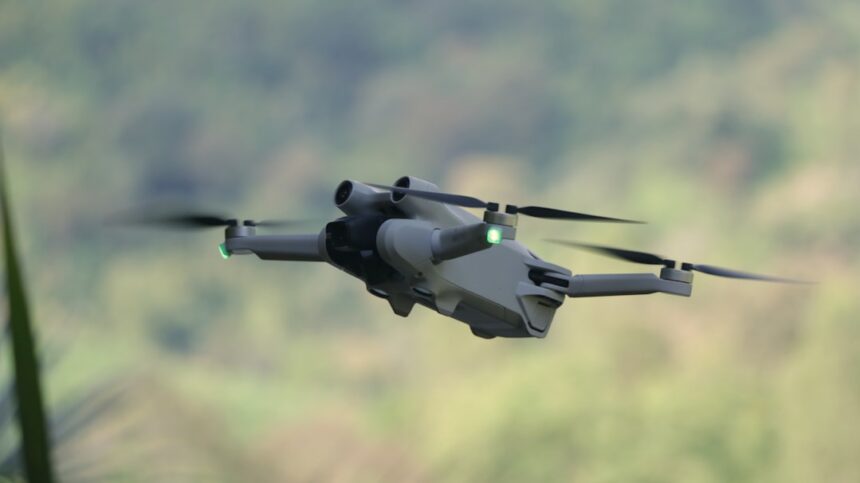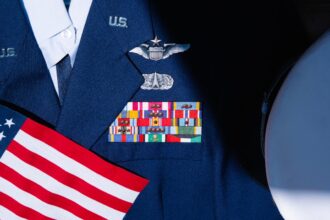The advent of artificial intelligence (AI) has revolutionized numerous sectors, and warfare is no exception. In recent years, the integration of AI into drone technology has transformed the landscape of military operations. Drones, once primarily used for surveillance, have evolved into sophisticated platforms capable of executing complex missions autonomously.
This evolution raises critical questions about the future of warfare, the ethical implications of using AI in combat, and the potential for increased efficiency in military operations. As nations invest heavily in these technologies, understanding the dynamics of AI in drone warfare becomes essential for policymakers, military strategists, and the global community. The intersection of AI and drone warfare presents a dual-edged sword.
On one hand, it offers unprecedented capabilities that can enhance operational effectiveness and reduce risks to human soldiers. On the other hand, it introduces a host of ethical dilemmas and legal challenges that must be navigated carefully. As drones equipped with AI become more prevalent on the battlefield, the implications for international security and military strategy are profound.
This article will explore the advantages and capabilities of AI in drone warfare, the ethical considerations surrounding its use, and the broader impact on global relations.
Key Takeaways
- AI has revolutionized the capabilities of drone warfare, allowing for autonomous decision making and collaborative warfare.
- The use of AI in drone warfare has significantly improved targeting and precision, leading to more effective and efficient operations.
- Ethical and legal considerations surrounding the use of AI in drone warfare are complex and require careful examination to ensure compliance with international laws and norms.
- Integration of AI with drone swarms has the potential to transform the landscape of warfare, presenting both opportunities and risks.
- The future of AI in drone warfare holds promise for further advancements in technology, but also raises concerns about international relations and diplomatic impacts.
Advantages and Capabilities of AI in Drone Warfare
One of the most significant advantages of integrating AI into drone warfare is the enhancement of operational efficiency. AI algorithms can process vast amounts of data in real-time, allowing drones to make informed decisions quickly. This capability is particularly valuable in dynamic combat environments where conditions can change rapidly.
For instance, AI can analyze surveillance footage to identify potential threats or targets with remarkable speed and accuracy, significantly reducing the time required for human operators to assess situations. This rapid decision-making process can be crucial in scenarios where every second counts. Moreover, AI-equipped drones can operate autonomously, reducing the need for constant human oversight.
This autonomy allows for extended missions without the fatigue that human operators might experience. Drones can be deployed in high-risk areas where human presence would be dangerous, thus minimizing casualties among military personnel. The ability to conduct missions without direct human control also opens up new possibilities for strategic operations, such as reconnaissance in hostile territories or precision strikes against high-value targets while minimizing collateral damage.
Ethical and Legal Considerations of AI in Drone Warfare

The deployment of AI in drone warfare raises significant ethical questions that cannot be overlooked. One primary concern is the potential for dehumanization in combat. As machines take on more decision-making roles, there is a risk that the moral weight of warfare may shift away from human operators.
The idea of machines making life-and-death decisions without human intervention challenges traditional notions of accountability and responsibility in military operations. This shift could lead to a desensitization to violence and a diminished sense of moral obligation among military personnel. Legal frameworks governing warfare are also being tested by the rise of AI in drone technology.
Current international laws, such as the Geneva Conventions, were established long before the advent of autonomous weapons systems. As a result, there is an urgent need for new regulations that address the unique challenges posed by AI-driven warfare. Questions arise regarding liability in cases of malfunction or unintended consequences resulting from autonomous actions.
Establishing clear legal guidelines will be essential to ensure that nations adhere to ethical standards while leveraging the advantages offered by AI in military operations.
Impact of AI on Targeting and Precision in Drone Warfare
| Metrics | Impact |
|---|---|
| Accuracy of Targeting | Improved with AI algorithms for precise identification and tracking of targets |
| Reduction in Collateral Damage | AI enables better discrimination between targets and non-combatants, reducing unintended casualties |
| Response Time | AI allows for faster decision-making and response to changing battlefield conditions |
| Adaptability | AI systems can adapt to new threats and tactics, enhancing overall precision in drone warfare |
AI’s influence on targeting and precision in drone warfare is profound and multifaceted. Advanced algorithms enable drones to identify and track targets with remarkable accuracy, significantly enhancing their effectiveness in combat scenarios. By utilizing machine learning techniques, drones can learn from previous engagements and improve their targeting capabilities over time.
This continuous learning process allows for more precise strikes, reducing the likelihood of collateral damage and civilian casualties. Furthermore, AI can integrate data from various sources, including satellite imagery, intelligence reports, and real-time battlefield information, to create a comprehensive picture of the operational environment. This holistic approach enhances situational awareness for military commanders and enables more informed decision-making regarding target selection.
The ability to conduct precision strikes with minimal collateral damage not only improves operational outcomes but also helps maintain public support for military actions by reducing civilian harm.
Role of AI in Autonomous Decision Making in Drone Warfare
The role of AI in autonomous decision-making within drone warfare is a topic of intense debate among military strategists and ethicists alike. Autonomous drones are designed to operate independently, making decisions based on pre-programmed parameters and real-time data analysis. This capability raises questions about the extent to which machines should be entrusted with life-and-death decisions on the battlefield.
Proponents argue that AI can enhance operational efficiency and reduce human error, while critics warn against relinquishing control to machines. The potential for autonomous decision-making also introduces concerns about accountability. In situations where an autonomous drone engages a target without human intervention, determining responsibility for any resulting harm becomes complex.
If an autonomous system misidentifies a target or causes unintended casualties, who is held accountable—the operator who programmed the system, the military leadership that deployed it, or the machine itself? These questions underscore the need for robust ethical guidelines and legal frameworks to govern the use of autonomous systems in warfare.
Challenges and Risks of AI in Drone Warfare

Despite its advantages, the integration of AI into drone warfare is fraught with challenges and risks that must be addressed. One significant concern is the potential for adversaries to exploit vulnerabilities in AI systems. As nations race to develop advanced drone technologies, there is a risk that malicious actors could hack or manipulate these systems to turn them against their operators or disrupt military operations.
Ensuring cybersecurity measures are robust enough to protect against such threats is paramount. Additionally, reliance on AI-driven systems may lead to overconfidence among military planners. The assumption that technology can solve complex problems may result in a diminished emphasis on traditional military strategies and human judgment.
Balancing technological advancements with sound military doctrine will be essential to mitigate these risks.
Integration of AI with Drone Swarms and Collaborative Warfare
The integration of AI with drone swarms represents a significant advancement in modern warfare strategies. Drone swarms consist of multiple drones operating collaboratively to achieve a common objective, often leveraging AI algorithms to coordinate their actions seamlessly. This collective approach enhances operational capabilities by allowing drones to cover larger areas, gather more intelligence, and execute complex maneuvers that would be challenging for individual units.
AI-driven drone swarms can adapt to changing battlefield conditions in real-time, making them highly effective in dynamic environments. For instance, they can autonomously adjust their formations based on threats or obstacles encountered during missions. This adaptability not only increases their effectiveness but also complicates enemy defenses, as swarms can overwhelm traditional air defense systems through sheer numbers and coordinated tactics.
Implications of AI on Air Defense Systems and Counter-Drone Technology
The rise of AI-powered drones necessitates advancements in air defense systems and counter-drone technology. As drones become more sophisticated and capable of autonomous operations, traditional air defense mechanisms must evolve to address new threats effectively. Nations are investing heavily in developing advanced radar systems, electronic warfare capabilities, and counter-drone technologies designed to detect and neutralize hostile drones before they can carry out their missions.
AI plays a crucial role in enhancing air defense systems by enabling faster detection and response times. Machine learning algorithms can analyze patterns in drone behavior and predict potential threats based on historical data. This predictive capability allows air defense systems to prioritize responses and allocate resources more efficiently, ultimately improving overall security against drone incursions.
Future Trends and Developments in AI and Drone Warfare
As technology continues to advance at an unprecedented pace, future trends in AI and drone warfare are likely to shape the nature of conflict significantly. One emerging trend is the increasing emphasis on hybrid warfare strategies that combine conventional military tactics with advanced technologies like AI-driven drones. This approach allows nations to leverage their technological advantages while maintaining traditional military capabilities.
Moreover, ongoing research into ethical AI development will likely influence how nations approach drone warfare in the future. As public awareness grows regarding the implications of autonomous weapons systems, there may be increased pressure on governments to establish international norms governing their use. The development of ethical guidelines for AI in warfare could lead to a more responsible approach to military operations involving drones.
International Relations and Diplomatic Impacts of AI in Drone Warfare
The proliferation of AI-powered drones has significant implications for international relations and diplomacy. As nations invest heavily in these technologies, concerns about an arms race emerge, with countries striving to outpace one another in developing advanced drone capabilities. This competition could lead to heightened tensions between nations as they seek to assert their dominance in aerial warfare.
Furthermore, the use of AI in drone warfare may alter traditional alliances and partnerships among nations. Countries that excel in drone technology may form coalitions based on shared interests in developing countermeasures or collaborative strategies for deploying drones effectively. Conversely, nations lacking advanced capabilities may find themselves at a strategic disadvantage, prompting them to seek alliances with technologically advanced partners.
Balancing the Benefits and Risks of AI in Drone Warfare
In conclusion, the integration of artificial intelligence into drone warfare presents both remarkable opportunities and significant challenges. The advantages offered by AI—enhanced operational efficiency, improved targeting precision, and autonomous decision-making—can transform military operations for the better. However, these benefits come with ethical dilemmas, legal uncertainties, and risks that must be carefully managed.
As nations navigate this complex landscape, it is crucial to strike a balance between leveraging technological advancements and upholding ethical standards in warfare. Establishing robust legal frameworks governing the use of AI in combat will be essential to ensure accountability and minimize unintended consequences. Ultimately, fostering international dialogue on these issues will be vital for promoting responsible practices while harnessing the potential benefits of AI-driven drone warfare for national security objectives.
In recent years, the integration of artificial intelligence in drone warfare has significantly transformed military strategies and operations. AI technologies enhance the capabilities of drones, enabling them to perform complex tasks with greater precision and efficiency. For a deeper understanding of how AI is reshaping military tactics, you can explore a related article on this topic by visiting In The War Room. This resource provides insights into the evolving role of AI in modern warfare and its implications for future conflicts.
FAQs
What is the role of AI in drone warfare?
AI plays a significant role in drone warfare by enabling autonomous decision-making, target identification, and navigation for drones. It also enhances the efficiency and effectiveness of drone operations.
How does AI enhance the capabilities of drones in warfare?
AI enables drones to process large amounts of data in real-time, identify and track targets, and make split-second decisions without human intervention. This enhances the speed, accuracy, and precision of drone operations.
What are the potential benefits of using AI in drone warfare?
The use of AI in drone warfare can potentially reduce human casualties, minimize collateral damage, and improve the overall effectiveness of military operations. It can also provide valuable intelligence and reconnaissance capabilities.
What are the concerns surrounding the use of AI in drone warfare?
Some concerns include the potential for AI to make erroneous decisions, the ethical implications of autonomous weapons, and the lack of human oversight in critical military operations. There are also concerns about the potential for AI to be hacked or manipulated by adversaries.
How is AI integrated into drone warfare systems?
AI is integrated into drone warfare systems through the use of advanced algorithms, machine learning, and computer vision technologies. These technologies enable drones to analyze and interpret data from various sources to make informed decisions in real-time.




